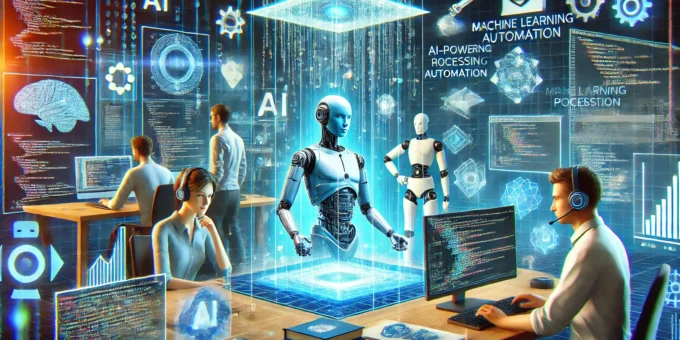
Introduction: The Evolution of AI in Software Development
Artificial intelligence (AI) and machine learning (ML) are revolutionizing the software development industry. From writing code to debugging and testing, AI is making the software development process faster, smarter, and more efficient.
Developers are leveraging AI-powered tools to automate repetitive tasks, detect errors, and optimize performance. This transformation is not only improving productivity but also redefining the role of software engineers in an AI-driven world.
This article explores how AI and machine learning are transforming software development, providing insights into the latest trends, tools, and future possibilities.
Understanding AI and Machine Learning in Software Development
The Role of AI in Modern Development
AI is not just a futuristic concept—it is actively reshaping how developers write, test, and deploy software. With AI-powered tools, developers can automate tedious tasks, analyze vast amounts of data, and improve decision-making processes.
Machine Learning’s Impact on Code Efficiency
Machine learning models can analyze previous codebases, predict best coding practices, and suggest improvements in real-time. These AI-driven insights help developers write cleaner, more efficient, and less error-prone code.
Automating Code Generation and Optimization
AI-Powered Code Suggestions and Autocompletion
AI-based coding assistants, such as GitHub Copilot and OpenAI’s Codex, are changing the way developers write code. These tools provide real-time code suggestions, autocompletion, and even generate entire functions based on comments or brief descriptions.
How AI Enhances Code Quality and Performance
AI-driven tools analyze code for inefficiencies, security vulnerabilities, and logical errors, offering suggestions for improvement. This results in higher-quality software with optimized performance.
AI-Driven Debugging and Error Detection
Identifying and Fixing Bugs Faster with AI
AI can analyze large codebases, detect patterns, and identify potential bugs before they cause system failures. This allows developers to fix issues proactively rather than reactively.
The Role of AI in Predictive Debugging
Predictive debugging leverages AI to anticipate errors based on past development data. By using ML algorithms, developers can catch bugs earlier in the development lifecycle, reducing debugging time and costs.
Machine Learning in Software Testing
How AI Automates and Improves Testing
Traditional software testing methods are time-consuming and require extensive manual effort. AI-driven testing tools automate test case generation, execution, and analysis, improving efficiency and accuracy.
AI-Powered Test Case Generation
AI can analyze software requirements and automatically generate test cases that cover all possible scenarios, ensuring thorough testing and faster bug detection.
AI and Machine Learning in DevOps
Enhancing CI/CD Pipelines with AI
AI optimizes continuous integration and continuous deployment (CI/CD) processes by predicting potential deployment failures, analyzing code changes, and automating rollbacks when necessary.
AI-Driven Performance Monitoring and Optimization
AI-powered monitoring tools track software performance in real-time, detecting anomalies and suggesting optimizations before they impact users.
Natural Language Processing (NLP) in Software Development
How AI Understands and Improves Code Documentation
Natural language processing (NLP) enables AI to generate, summarize, and improve software documentation, making it easier for developers to understand and maintain code.
The Role of NLP in Automated Code Reviews
AI-powered code review tools use NLP to analyze code comments, detect inconsistencies, and provide feedback, improving code readability and maintainability.
AI-Generated Software Development Assistants
AI Chatbots and Virtual Coding Assistants
AI-powered chatbots and virtual assistants, such as ChatGPT and Tabnine, help developers troubleshoot issues, suggest best practices, and assist in writing complex code snippets.
The Future of AI in Software Collaboration
AI is facilitating seamless collaboration among developers by providing intelligent recommendations, tracking project progress, and even suggesting workflow improvements.
The Ethical and Security Challenges of AI in Software Development
Bias and Fairness in AI-Generated Code
AI algorithms can inherit biases from training data, leading to unfair or unintended outcomes. Developers must ensure fairness and ethical considerations when using AI-generated code.
AI and Cybersecurity in Software Development
AI is a double-edged sword in cybersecurity—it helps detect vulnerabilities but can also be exploited by cybercriminals. Businesses must implement robust security measures to protect AI-driven software.
The Future of AI and Machine Learning in Software Development
The Next Evolution of AI-Powered Programming
AI’s role in software development will continue to expand, with advancements in self-learning algorithms, automated software generation, and improved AI-human collaboration.
How AI Will Shape the Role of Software Developers
While AI automates many coding tasks, human developers will still be essential for creative problem-solving, ethical decision-making, and designing AI-driven solutions.